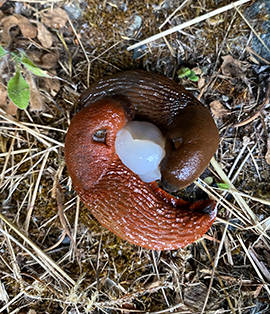By Sabine Price
WSU Master Gardener
Spring has finally arrived, and we are getting ready to start planting flowers and vegetables for the coming growing season. We can’t wait to get our hands dirty as we sometimes wonder how to keep our gardens happy and healthy. Have you ever heard about integrated pest management? If not, and if you would like to know more, then you have come to the right place!
No garden, despite the gardener’s best efforts, is ever without pests and diseases. Destructive organisms that fly, crawl, creep or leap will enter even the well-tended yard eventually. Gardens are microcosms where plants, insects, bacteria, fungi, and earthworms live and thrive. Most of these organisms behave themselves, but once in a while, a troublemaker will find its way into this living-together-in-harmony system, and some extra help is needed to restore peace and happiness in the garden.
Integrated pest management is a strategy that does not eliminate garden pests but strives to keep them under control and to reduce their damage to tolerable levels. It’s a gentler method for the environment and for your garden. IPM relies on alternative techniques for pest control and garden problems. These include biological control, resistant varieties, crop rotation and a few other methods.
The question is, then how do you “IPM”? The first step is a mantra among master gardeners: choose the right plant for the right place. It means living in coastal Grays Harbor will require choosing different plants than those that gardeners in tropical climates would grow. Native plants that are disease and pest resistant to this area will do best. For Ocean Shores you may want to consider adding deer-resistant as one of the requirements for the right plant. Every Ocean Shores resident knows how important this is!
Half the battle against pests is already won when you choose the right plant for your environment. Proper planting techniques, crop rotation done yearly to avoid disease and pest build-up, proper pruning to allow for good air flow, and mulching to avoid weeds are IPM strategies to get your garden off to a great start.
Once the garden is planted we monitor our plants for signs of trouble. If we find a situation that is not to our liking, there are several options for dealing with it. We can physically remove the diseased parts of the plant such as pruning the branches of a tree that is infested with webbing caterpillars or using water to hose off plants that are infested with aphids. Biological pest control may be goats that eat all your weeds. Now, if goats in your yard is not quite your idea of pest control, then perhaps planting ground covers that discourage the growth of weeds might be the IPM strategy for you. In case the issue seems minor and tolerable we may even decide to not take any action at all.
If nothing else seems to work then we may want to consider chemical control methods to deal with the pests. However, we always choose an environmentally friendly choice that is safe for bees and beneficial insects. We need to know when, where and how to apply the pesticide, and we always want to read the entire label of the product first to ensure safe and correct application.
Proper plant choices and planting techniques are the first step to IPM. Some knowledge of plant health care is helpful as it makes monitoring situations easier. If, however, all this seems to require a little more time and energy than anticipated and desired, there is another solution: Ask a Master Gardener! We are always available and happy to assist with any issues or questions you might have.
Master gardeners are volunteer community educators who have completed a master gardener extension program with Washington State University, and who have extensive knowledge in home and hobby gardening matters. Best thing — this service is always completely free of charge! Should you be interested in more information, please visit these internet sources:
gardening.wsu.edu/pest management
ipm.wsu.edu/newsletter
Another option is to ask your question directly online at
pnwmg.org/ask-a-master-gardener/
No matter which approach you prefer, your best bet is to always “Ask a Master Gardener!”
Sabine Price is a Grays Harbor/Pacific County Master Gardener, Class of 2020. She recently moved permanently to Ocean Shores and is loving life in Ocean Shores and getting involved in the community. WSU Extension programs and employment are available to all without discrimination. Evidence of noncompliance may be reported through your local WSU Extension Office.


